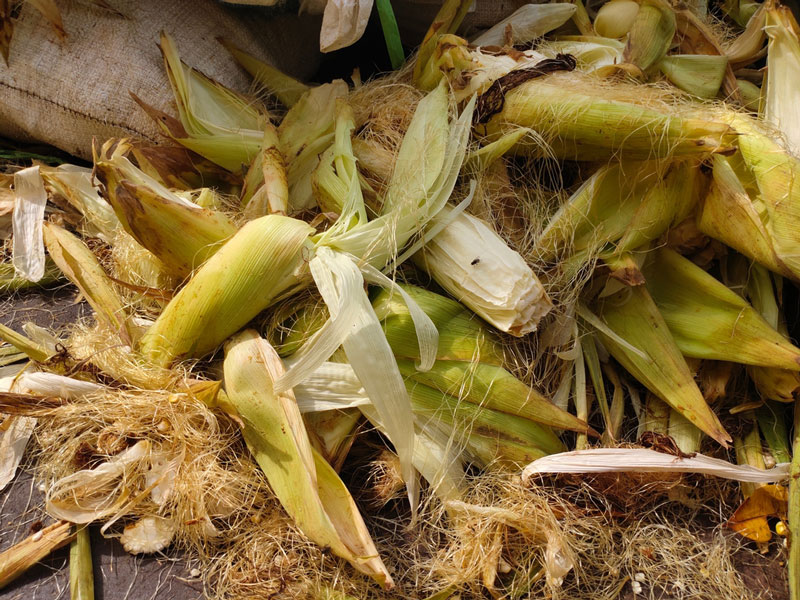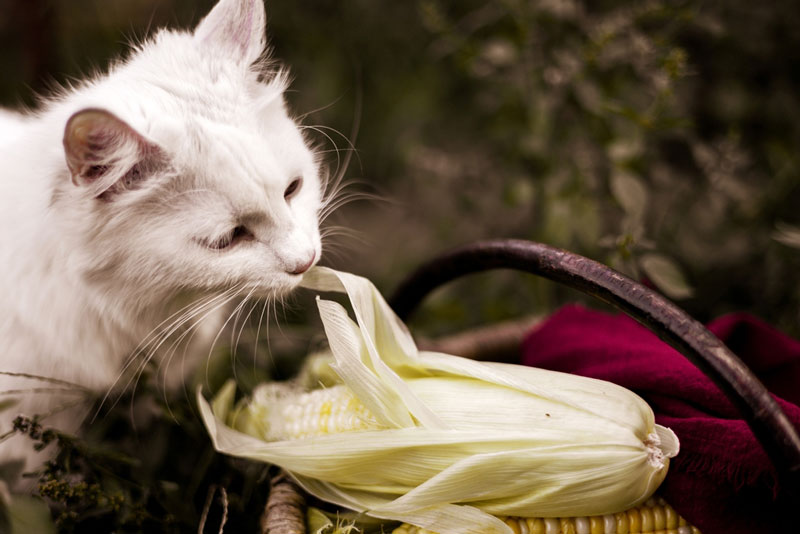Can cats eat corn husks? This is a question that many pet owners ask, especially when they find themselves enjoying a lovely corn on the cob. The answer is not as clear-cut as one might think. Cats are obligate carnivores, which means their diet primarily consists of meat. However, when it comes to corn husks, they aren’t toxic for cats, but that doesn’t necessarily mean they should be a staple in their diet. So, can cats eat corn husks? The short answer is yes, but there are some factors to consider.
The interesting aspect of our furry friends is that even though they have a specific dietary preference, they can occasionally show curiosity towards human food. Corn husks, being a fibrous part of the corn plant, might catch their attention. While it is safe for cats to nibble on a tiny piece, it’s critical to note that it doesn’t provide the nutritional value they require. Instead, they thrive on high-protein foods and need a balanced diet to maintain their health.
If you want to find out more about whether cats can eat corn husks and how it impacts their diet, we encourage you to keep reading. We’ll explore the benefits, risks, substitutes, and some frequently asked questions surrounding this topic. Let’s get started!
You might also be interested in: Can Cats Eat Apple Skin?
Can Cats Eat Corn Husks?

Corn husks come from the outer covering of corn. While they are not harmful, they don’t necessarily contribute to our cats’ dietary needs. Corn husks are mainly composed of cellulose, which means they are fibrous and not easily digestible for cats. Cats generally lack the enzymes required to break down fiber, which can lead to tummy troubles if they ingest too much.
When considering whether we should offer corn husks to our feline friends, we must remember their instincts as hunters. In the wild, cats would consume mainly meat, and their digestive systems are adapted for that kind of diet. Although many cats seem to enjoy the taste and texture of corn husks, it doesn’t provide the same benefits as their usual meals.
So, while it’s safe for cats to nibble on small amounts of corn husks here and there, we wouldn’t want to make it a regular treat. Moderation is the name of the game! If you do decide to give your cat a small piece of corn husk, ensure it’s fresh, and monitor them for any adverse reactions, such as vomiting or diarrhea.
In conclusion, while corn husks aren’t toxic to cats, it’s best to stick to cat-appropriate treats that serve their nutritional needs. We can enjoy our grilled corn on the cob without worrying too much, but let’s keep the corn husks to a minimum for our furry companions.
How Much Corn Husks Can Cats Eat?
Let’s talk about how much corn husk is safe for our cats. While we established that corn husks are not toxic, moderation is key. If our cats show interest in munching on corn husks, we can consider offering them a tiny piece as a rare treat. However, a little goes a long way!
It’s best to start with just a small shred of corn husk. This way, we can gauge how our cats react to it. Since cats are smaller creatures compared to us, even a bite-sized piece is ample. If they seem to enjoy it without any digestive issues, we can offer it occasionally, but not regularly.
Remember, the majority of a cat’s diet should come from high-quality cat food that meets their protein needs. We shouldn’t replace their meals with corn husks or other non-meat items. Cats require essential nutrients found in animal proteins, so any side treat should always be considered a bonus, not a replacement.
If we allow our cats to explore human food, we should ensure it’s safe and healthy. In practice, offering too much corn husk or similar foods can lead to gastrointestinal discomfort for them. Cats with sensitive tummies might even struggle more than others, which means it’s crucial to monitor their reactions after trying new treats.
So, as a rule of paw, the golden guideline is to keep corn husk treats infrequent and limited in portion size. Let’s make sure our little companions receive a well-balanced diet so they can thrive!
Benefits Of Corn Husks To Cats
1. We all want what’s best for our cats, and while corn husks are not exactly filled with nutrients, they can offer some fiber. This might help support a healthy digestive system if presented in small amounts. Every cat is different, but fiber can be beneficial for those who occasionally experience a sluggish tummy.
2. Having a variety of textures to chew on can provide mental stimulation. Cats are curious by nature, and offering a piece of corn husk can introduce them to new flavors and textures. It could keep them entertained and engaged while we prepare their meals or when we are busy with tasks around the house.
3. Another potential benefit lies in the experience of shared moments with our felines. Cats can remarkably pick up on our moods, and treating them occasionally can foster a bond, even over something as simple as a corn husk. It becomes a fun ritual where they feel included and loved.
4. Some cats might also enjoy the taste of corn husks. Though it should not be a central part of their diet, if they show interest, it’s an opportunity to make them happy! Satisfying their curiosity encourages a healthy relationship with food and treats.
5. Lastly, sharing food can be a way to teach them manners and boundaries when it comes to food outside of their designated meals. By modeling healthy food behaviors and encouraging them to try something that isn’t harmful, we help them learn about moderation, and that’s a life lesson worth sharing!
Substitute Of Corn Husks For Cats
Even if corn husks are generally safe, we must be aware of potential risks. One risk is the possibility of gastrointestinal blockage. If a cat consumes too large a piece of corn husk, it could lead to digestive issues. This is particularly true for cats with small stomachs or those who are prone to digestive sensitivities.
Another potential issue could happen if a cat develops an interest in eating a significant amount of corn husk. If they get carried away and consume too much, they could experience adverse reactions such as vomiting, diarrhea, or stomach upset. None of us want to see our beloved pets uncomfortable, so please keep an eye on what they munch on.
Furthermore, while corn husks contain fiber, they don’t provide essential nutrients that our feline friends need in their diets. Feeding them corn husks can lead to an imbalance in their diet. If our cats start opting for corn husks over their regular meals, this could harm their health. As much as we want to share with our cats, it’s crucial to remember their dietary requirements to foster optimal health.
Another point to consider is allergenic reactions. Some cats might have sensitivities or allergies to certain plants, including corn. If a cat has previously shown signs of food allergies or sensitivities, introducing corn husks could amplify the issue. Indicators like itching, swelling, or respiratory problems can be alarm signs to act upon.
Finally, we should always consider the source of the corn husk. It is essential that corn husks come from fresh, organic sources. If there are pesticides or other chemicals involved, it could harm our pets. It’s best to be cautious and ensure they are free from harmful substances. Always wash fruits and vegetables thoroughly before offering any pieces to our furry pals!
Substitute Of Corn Husks For Cats
1. Dehydrated Chicken or Turkey: If we’re concerned about corn husks or their digestibility, we can consider alternative treats that are more suitable for our little hunters. One great substitute is dehydrated chicken or turkey. These meats provide both high protein and flavor while doing wonders for their taste buds. We can easily find them available as cat treats or even make some at home!
2. Catnip: Another option is catnip! Most cats love it, and aside from being safe, it provides a whimsical experience. Catnip can offer entertainment, and it also has relaxing properties. Many of us have seen how cats react to it; it can generate a fun playtime session!
3. Cooked Vegetables: We might also consider small pieces of cooked vegetables, like carrots or green beans, which can be healthy options. Steamed carrots, when cut into small bites, can be a nutritious treat. It’s essential that we avoid adding butter or seasoning when preparing these for our cats.
4. Blueberries: Small amounts of fruits like blueberries could be a lovely alternative. Blueberries are rich in antioxidants and small enough that they won’t pose a choking hazard for our furry friends. They can be a refreshing treat on hot days, but always remember to consult a vet before introducing new foods.
5. Dental Chews: If our cats enjoy chewing on things, we can opt for dental chews that help with oral health. These products often combine taste with dental benefits, making it a win-win situation! They help increase their natural chewing habits while contributing to healthier teeth and gums.
Can Cats Eat Corn Husks? Frequently Asked Questions
Are Corn Husks Harmful To Cats?
No, corn husks are not harmful and are not toxic; however, moderation is key. Feeding a large quantity to cats might lead to digestive issues.
Can All Cats Eat Corn Husks?
While most cats can safely nibble on corn husks, it’s always best to monitor specific reactions. Cats with dietary restrictions or allergies may want to avoid them.
What Should I Do If My Cat Eats Too Much Corn Husk?
If your cat consumes too much corn husk and shows signs of distress like vomiting or discomfort, contact a veterinarian for advice.
What Are Better Alternatives To Corn Husks For My Cat?
Consider offering high-protein treats like chicken or turkey, catnip, small bites of cooked vegetables, or dental chews for better alternatives.
Should I Avoid Feeding Any Cat Human Foods?
Yes, always do thorough research regarding human foods before sharing. Some foods can be toxic to cats, so it’s best to play it safe!
Final Thoughts
As we’ve explored, while corn husks are not harmful, they don’t add value to our cats’ diets. Mondration is key, and it is important to prioritize their nutritional needs in choosing what they eat. Instead, we can treat our cats to safe alternatives like meat treats or cat-safe fruits and vegetables. Let’s keep the joy of bonding alive while ensuring they maintain a healthy lifestyle.
We hope this article answered your questions regarding can cats eat corn husks and provided valuable insights into what we can offer our felines. If you want to learn more about pet nutrition and care, feel free to check out topics like Can Cats Eat Orange Peels? for more fun and interesting information!


